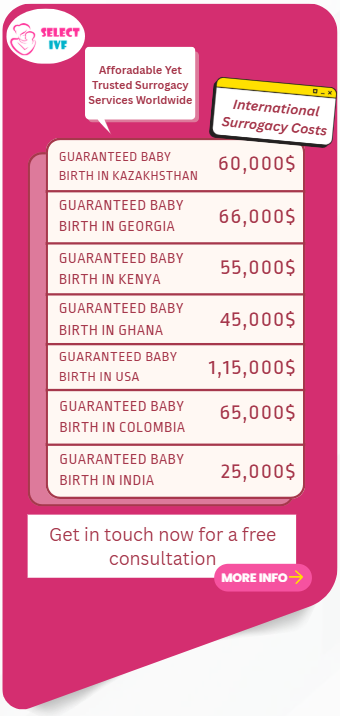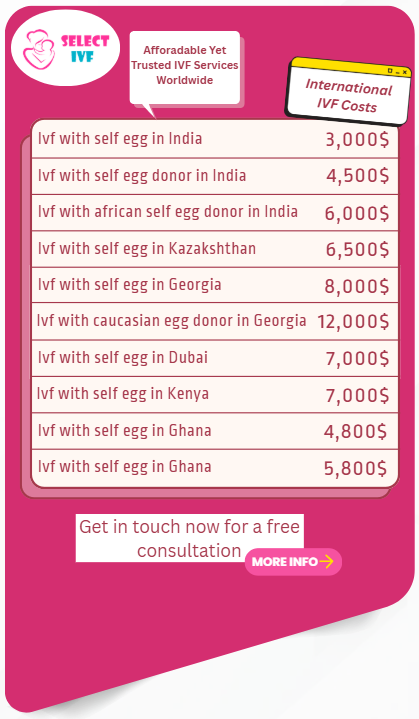Surrogacy in India has become a hopeful option for international couples struggling with infertility. With its advanced medical infrastructure, skilled fertility specialists, and relatively lower costs compared to Western countries, India attracts couples from across the globe seeking to build their families. For many, surrogacy in India is not just about affordability but also about accessibility to world-class treatment and compassionate care.
While the country has undergone several legal reforms to regulate surrogacy practices, the process still offers a viable and ethical solution when guided by registered clinics and legal frameworks. International couples are often drawn to India for the professional approach, medical transparency, and emotional support offered throughout the surrogacy journey.
Understanding the eligibility, legal aspects, and procedural steps is crucial for a smooth experience. This article explores the key aspects of Surrogacy for International Couples in India, including costs, legalities, and the process involved.

Why should you trust SELECT best IVF center in Gujarat?
- First-stage top counseling sessions
- Premium services and processes
- Highly competent specialists for best IVF center in Gujarat
- Sky-high IVF success rates in Gujarat
- Contact us Email ID: info@selectivf.com
- Call us: +91- 9899293903
What is Surrogacy?
Surrogacy is a fertility treatment where a woman, called the surrogate, agrees to carry and deliver a baby for another person or couple known as the intended parents. There are two types of surrogacy in India:
Traditional Surrogacy: Where the surrogate’s own egg is used for the fertilisation process.
Gestational Surrogacy: Where the embryo is created using the intended parents’ or donor’s egg and sperm, and the surrogate has no genetic link to the child. This surrogacy is commonly used by the intended parents.
India only permits gestational surrogacy under strict laws and only for altruistic reasons. It means without commercial benefits. So, as per the Surrogacy Regulation Act 2021, traditional surrogacy and commercial surrogacy are banned.
The process of surrogacy at Select IVF
The procedure of surrogacy step-by-step in India, in Select IVF, takes 11 to 18 months for both domestic and international patients. We have specialised plans for international patients and have personalised options for domestic patients.
First, let’s talk about our domestic and international patients’ procedure of surrogacy step-by-step in the form of a table for your easy understanding:
| The procedure of surrogacy for domestic patients | Domestic patients for surrogacy in India | The procedure of surrogacy for International Patients | International patients for surrogacy in India |
| Consultation | Discussion of causes of infertility, the success rate of surrogacy, cost, and other essential things with domestic patients. | Contact a clinic & get a consultation | Reach out to a reputable clinic in India such as Select IVF. Get a consultation by phone to discuss your medical history and suitable treatment options. |
| Ovarian stimulation | Providing hormonal injections to women or egg donors to produce eggs | Initial consultation | Schedule an initial consultation with the surrogacy specialist to discuss essential things such as the medical history, costs, success rate, etc. |
| Egg retrieval | Eggs are harvested from the uterus of the woman using a catheter | Application for a medical visa | Get a medical visa from India, this thing typically requires documentation. |
| Sperm collection | Sperms are gathered from the male partner | Testing | Tests advised by fertility doctors such as blood tests, semen analysis, and other procedures. |
| Fertilization | Eggs and sperm are combined together on a laboratory dish to form an embryo | Ovarian stimulation | Providing hormonal injections to women or egg donors to produce eggs |
| Embryo transfer | The embryo formed through fertilization is placed into the uterus of the woman | Egg retrieval | Eggs are harvested from the uterus of the woman using a catheter |
| Pregnancy check | After 12 days, a blood test is performed to check the results of the embryo transfer | Sperm collection and fertilization | Sperms are gathered from the male partner, & Eggs and sperm are combined together in a laboratory dish to form an embryo |
| Embryo transfer & pregnancy check | The embryo formed through fertilization is placed into the uterus of the woman, & After 12 days, a blood test is performed to check the results of the embryo transfer. |
Surrogacy law in India
India’s surrogacy regulations have seen a major shift with the implementation of the Surrogacy (Regulation) Act, 2021. This law permits only altruistic surrogacy and bans commercial surrogacy. It also clearly defines who is eligible to undertake surrogacy in India.
Under the new law:
- Only Indian heterosexual married couples (married for at least five years) can legally pursue surrogacy.
- The couple must be medically certified as infertile or unable to conceive.
- Surrogacy must be altruistic, meaning the surrogate mother cannot be paid beyond medical expenses and insurance.
- Surrogacy is not permitted for foreign nationals, single individuals, live-in couples, LGBTQ+ couples, or commercial surrogacy agents.
Surrogacy for International Couples in India
India was once a top destination for international couples seeking surrogacy due to its affordability and advanced fertility services. However, with the passing of the Surrogacy (Regulation) Act, 2021, the country no longer allows foreign nationals to opt for surrogacy within its borders. This includes commercial surrogacy, which was previously common and legal.
International couples are now prohibited from undergoing surrogacy in India, regardless of their medical condition or intent. They are advised to explore countries where laws are more accommodating and transparent for non-citizens seeking surrogacy.
Are NRI or OCI cardholders eligible for surrogacy in India?
Yes, NRI (Non-Resident Indians) and OCI (Overseas Citizen of India) cardholders are eligible for altruistic surrogacy and gestational surrogacy in India if they meet the criteria under the Surrogacy Act. Key conditions include:
- The NRI or OCI must be Indian by origin and married to another Indian or OCI/NRI partner.
- The couple must be legally married for at least five years.
- They must provide a medical certificate of infertility.
- The surrogacy must be altruistic, not commercial.
- They must obtain a certificate of essentiality and eligibility from the appropriate authority.
Surrogacy Cost in India
Surrogacy is a series of complex procedures that involve the help of a surrogate, several medical examinations & procedures, and advanced ART technologies such as IVF, ICSI, IUI, cryopreservation, PGT, PGD, etc. These factors make up the overall surrogate cost. The average cost of surrogacy in India ranges between ₹12,00,000 to ₹20,00,000.
With the help of the following table, you will understand the cost of surrogacy in India:
| Surrogacy Procedure in India | Cost of surrogacy in India (INR) |
| Surrogacy using own eggs & own sperm | Rs. 12 Lakh To 18 Lakh |
| Surrogacy by donor eggs and own sperm | Rs. 13 Lakh to 19 Lakh |
| Surrogacy with donor sperm and own eggs | Rs. 14 Lakh to 20 Lakh |
| Surrogacy (cost) & Embryo Transfer (Cost) | Up to Rs. 4 Lakh |
| Surrogate Mother Selection (Cost)+ Blood Tests (Cost) + Surrogate Mother Preparation (Cost) | Up to Rs. 2 Lakh |
| Normal Vaginal Delivery Cost | Up to Rs. 70,000 |
| Cesarean section or C-section Delivery Cost | Up to Rs. 1 Lakh to 2 Lakh |
| Housing for Surrogate mother (Cost) + Food (Cost) | Up to Rs. 3 Lakh |
The following will help you to understand the surrogacy treatment cost in different states of India:
| States of India | Cost of surrogacy in different states of India (INR) |
| Surrogacy cost in Andheri | 12 to 20 lakh |
| Surrogacy cost in Hyderabad | 12 to 18 lakh |
| Surrogacy cost in Bangalore | 14 to 20 lakh |
| Surrogacy cost in Delhi | 13.4 to 23.7 lakh |
| Surrogacy cost in Mumbai | 14.65 to 24 lakh |
| Surrogacy cost in Punjab | 10.08 to 20 lakh |
| Surrogacy cost in Haryana | 12.64 to 20 lakh |
| Surrogacy cost in Rajasthan | 15.9 to 20 lakh |
| Surrogacy cost in Uttar Pradesh | 14 to 21 lakh |
| Surrogacy cost in Madhya Pradesh | 14 to 20.02 lakh |
| Surrogacy cost in Dehradun | 14.91 to 20 lakh |
| Surrogacy cost in Bihar | 13.5 to 20 lakh |
| Surrogacy cost in Jharkhand | 14 to 20 lakh |
| Surrogacy cost in Assam | 12 to 18 lakh |
| Surrogacy cost in Gujarat | 14 to 20.8 lakh |
| Surrogacy cost in Tamil Nadu | 14.47 to 23 lakh |
| Surrogacy cost in Andhra Pradesh | 14 to 20 lakh |
| Surrogacy cost in Himachal Pradesh | 14.06 to 20.62 lakh |
Factors Affecting the Surrogacy Cost in India
While the estimated cost range gives a basic idea, several specific factors can cause variations:
1. IVF Cycle Complexity
If multiple IVF cycles are required to achieve a successful embryo, the costs increase. If donor eggs or sperm are needed, there are additional charges.
2. Surrogate Health and Care
If the surrogate has special medical needs or if there are pregnancy complications, additional care and hospitalization charges may apply.
3. Legal and Administrative Fees
Drafting contracts, completing the legal paperwork, court appearances, and registration costs can vary between law firms and states.
4. Delivery Method
If a normal delivery occurs, the cost is lower. However, if a C-section is required or if the surrogate or baby needs extended hospitalization, costs rise.
5. Use of Donor Programs
If you require egg donation, sperm donation, or embryo donation, additional charges apply, depending on the donor’s background, screening, and compensation.
6. Clinic Reputation and Technology
Well-established fertility centres with higher success rates often charge slightly higher fees because they offer better technology, experienced doctors, and better overall success chances.
7. Insurance Coverage
New insurance policies are mandatory for surrogate mothers under Indian law, and the cost of comprehensive coverage is added to your package.
What is the success rate of surrogacy for international couples in India?
The success rate of surrogacy for international couples in India is determined by combining many factors that including the age of the surrogate mother, age of the intended couple, the skills and expertise of the surrogacy practitioners, the number of IVF attempts involved in the surrogacy process, and the usage of technology and the technique. So its success rate ranges from 80 to 98% in India. In short, the success rate of surrogacy in India varies based on the patient’s overall condition and case complexity.
With the help of the following table, you will understand the surrogacy success rate in India:
| Surrogacy treatment in India | Success rates of surrogacy in India |
| Surrogacy with self-eggs | 50 to 90% |
| Surrogacy with self-sperm | 55 to 80% |
| Surrogacy with donor eggs | 70 to 95% |
| Surrogacy with donor sperm | 73 to 97% |
| Surrogacy with FET | 60 to 65% |
| Surrogacy with ICSI | 50 to 65% |
What should you consider when selecting the top surrogacy clinic in India?
We understand how difficult it is to select the best option for your infertility treatment, but do not get tense, as one of the best options is going to be suggested to you where the patient collaborates with highly experienced and qualified doctors. The patient will find it comfortable as the staff will always stand by them, away from all the worries that come to their mind. We offer all types of infertility treatment, so contact us today! To start, consider the following factors while selecting a location:
i. The patient-focused assistance of the centre
ii. Professionals with extensive education and experience
iii. Infrastructure that is well-built for maximum comfort and happiness
iv. The entire medical staff treats you with respect
v. Assists you throughout the entire process from the beginning
vi. Offers transparent fees and processes
You have the option of choosing surrogacy for all of these! So, reach out to us at +91- 9899293903 | Email ID: info@www.selectivf.com
Why pick Select IVF for surrogacy in India?
Several infertile couples trusted the select IVF for their bright future. We care for every patient who has issues of infertility. We understand the phase of infertility, and that’s why we want to assist you in your dream of achieving parenthood.
The prices of surrogacy treatment are reasonable at our centre, We ensure the highest success rates, we maintain transparency, and ensure personalised care and support to our patients. Get the treatment from our clinic and make your life stress-free by hearing the giggling of your newborn.
Here’s why Select IVF is best for surrogacy treatment in India:
- The high success rate of surrogacy and other infertility treatments
- Several infertility treatments for different infertility issues
- Use of cutting-edge technologies
- Equipped with highly skilled and educated doctors
- Affordable prices for surrogacy and other infertility treatments
- Ensures utmost comfort and support during the procedure
Last words
Surrogacy in India has undergone significant legal transformations in recent years, impacting its availability for international couples. While India once stood as a global hub for affordable and accessible surrogacy, the current laws now restrict this option to Indian citizens only, particularly for altruistic surrogacy. Despite these restrictions, the country still offers high standards of fertility treatments, and international couples can explore ethical alternatives in countries with more favorable laws. For those considering surrogacy abroad, it is crucial to stay informed about legal, medical, and procedural guidelines to ensure a safe and successful journey to parenthood. Consulting with trusted fertility clinics and legal experts can help navigate this sensitive and life-changing process.
FAQs (Frequently Asked Questions)
Can a foreigner have surrogacy in India?
No, as per the Surrogacy (Regulation) Act, 2021, foreign nationals are not allowed to opt for surrogacy in India. Only Indian heterosexual married couples and Indian women under specific criteria can pursue altruistic surrogacy.
How to get permission for surrogacy in India?
Indian couples must fulfill specific criteria, such as being legally married for at least five years, being Indian citizens, and having a proven medical need. Approval must be obtained from the appropriate authorities, including the National or State Surrogacy Board and a district medical board.
What is the age limit for a surrogate mother?
According to Indian regulations, a surrogate mother must be a married woman aged between 25 and 35 years and should have at least one biological child of her own.









